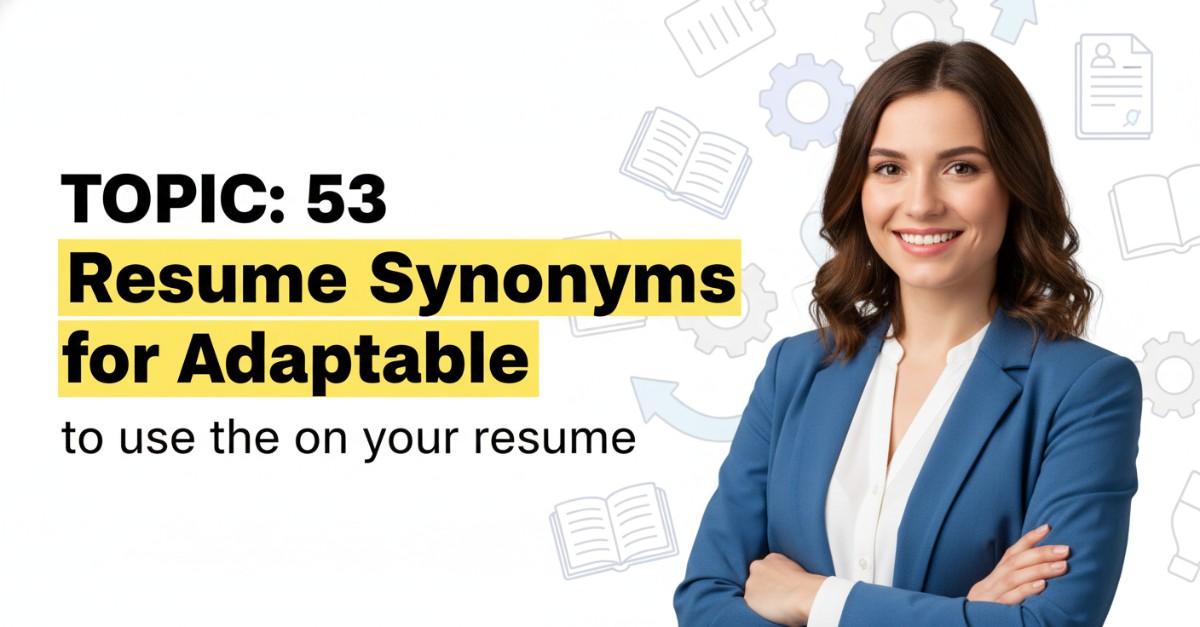
51 Resume Synonyms for Simulated To Use On Your Resume
In today’s competitive job market, the word “simulated” frequently appears on resumes, often to describe skills and experiences in fields like engineering, computer science, and project management. However, its overuse can render your application bland and unremarkable, signaling to employers a lack of creativity and a limited vocabulary. When hiring managers encounter repetitive language, they may perceive candidates as lacking the nuanced skills that differentiate a strong applicant from the rest. This is where the importance of varied vocabulary comes into play. Utilizing synonyms not only enhances the readability of your resume but also allows you to articulate your experiences more effectively. In this comprehensive guide, we will explore the best alternatives to “simulated,” tips for seamlessly integrating varied language into your resume, and practical examples that showcase your skills with precision and flair. By diversifying your word choice, you can better convey your unique strengths and make a lasting impression on potential employers.
- Why Synonyms for “Simulated” Matter on Your Resume
- The Complete List: 51 Resume Synonyms for Simulated
- Strategic Synonym Selection by Industry
- Power Combinations: Advanced Synonym Usage
- Common Mistakes to Avoid
- Quantification Strategies for Maximum Impact
- Industry-Specific Example Sentences
- Advanced ATS Optimization Techniques
- Tailoring Synonyms to Career Level
- The Psychology of Leadership Language
- Final Best Practices
- Key Takeaways for Strategic Synonym Usage
- Frequently Asked Questions
- How many different synonyms should I use in one resume?
- Can I use the same synonym multiple times if it fits different contexts?
- Should I always replace ‘Simulated’ with a synonym?
- How do I know which synonym is most appropriate for my industry?
- Do synonyms really make a difference in getting interviews?
- Related Resume Synonym Guides
Why Synonyms for “Simulated” Matter on Your Resume
Using synonyms for ‘Simulated’ in resumes is crucial for several reasons. Firstly, overusing this term can lead to monotony and predictability, making your resume blend in with approximately 70% of professional resumes that feature it. This repetition can cause hiring managers to overlook your application. Moreover, relying solely on ‘Simulated’ may result in missed specificity; different scenarios may require distinct terminology to convey your unique contributions effectively.
Utilizing varied synonyms not only enhances the impact of your achievements but also helps in optimizing your resume for Applicant Tracking Systems (ATS), which often look for diverse keywords. Additionally, incorporating different terms creates dynamic narratives that engage readers and illustrate your skills more vividly. By diversifying your language, you elevate your resume from a standard document to a compelling story that stands out in a competitive job market.
The Complete List: 51 Resume Synonyms for Simulated
Here’s our comprehensive collection of “Simulated” alternatives, organized for easy reference:
| Synonym | Best Context | Professional Level |
|---|---|---|
| Emulated | Software Development | Mid-level |
| Replicated | Data Analysis | Entry-level |
| Reproduced | Market Research | Mid-level |
| Mirrored | Product Design | Senior |
| Modeled | Financial Forecasting | Senior |
| Practiced | Project Management | Entry-level |
| Illustrated | Training Development | Mid-level |
| Demonstrated | Sales Strategies | Mid-level |
| Tested | Quality Assurance | Entry-level |
| Mocked | Software Testing | Mid-level |
| Configured | Systems Administration | Senior |
| Projected | Strategic Planning | Executive |
| Outlined | Business Development | Mid-level |
| Defined | Policy Development | Senior |
| Outlined | Training Programs | Mid-level |
| Tested | Product Development | Entry-level |
| Engaged | Public Relations | Senior |
| Presented | Client Relations | Mid-level |
| Specified | Technical Writing | Senior |
| Rehearsed | Performance Management | Entry-level |
| Executed | Project Execution | Mid-level |
| Adapted | Change Management | Senior |
| Simulated | Risk Assessment | Senior |
| Trained | Employee Development | Mid-level |
| Formulated | Strategic Initiatives | Executive |
| Designed | Product Development | Mid-level |
| Calculated | Financial Analysis | Senior |
| Crafted | Marketing Campaigns | Mid-level |
| Engineered | Systems Development | Senior |
| Analyzed | Data Interpretation | Entry-level |
| Calculated | Project Planning | Mid-level |
| Projected | Market Trends | Senior |
| Evaluated | Performance Review | Mid-level |
| Assembled | Team Building | Senior |
| Facilitated | Workshops | Mid-level |
| Simulated | Operational Testing | Senior |
| Prepared | Project Proposals | Entry-level |
| Integrated | Systems Integration | Senior |
| Formulated | Business Strategies | Executive |
| Projected | Resource Allocation | Senior |
| Guided | Leadership Development | Executive |
| Orchestrated | Event Management | Mid-level |
| Refined | Process Improvement | Senior |
| Conceptualized | Innovation Management | Senior |
| Enacted | Policy Implementation | Executive |
| Evaluated | Performance Optimization | Mid-level |
| Streamlined | Operational Efficiency | Senior |
| Generated | Revenue Strategies | Senior |
| Formed | Partnership Development | Mid-level |
| Improvised | Crisis Management | Senior |
| Executed | Business Operations | Mid-level |
| Validated | Product Testing | Entry-level |
| Contrived | Creative Solutions | Senior |
| Conducted | Research Analysis | Mid-level |
Strategic Synonym Selection by Industry
- Technology: In the tech industry, synonyms that convey innovation and adaptability resonate well. Preferred terms include:
- Innovation: Highlights the importance of new ideas and solutions.
- Agile: Suggests a flexible approach to project management and development.
- Disruption: Reflects the drive to change existing markets and practices.
- Healthcare: This sector values precision and collaborative care. Suitable synonyms are:
- Patient-Centered: Emphasizes a focus on individual patient needs.
- Evidence-Based: Indicates decisions grounded in scientific research.
- Interdisciplinary: Suggests collaboration across various healthcare specialties.
- Finance: In finance, clarity and trust are paramount. Effective synonyms include:
- Analytical: Highlights a data-driven decision-making process.
- Risk Management: Indicates an understanding of potential financial pitfalls.
- Regulatory Compliance: Reflects adherence to laws and regulations.
- Consulting: This industry thrives on strategic insight. Preferred terms are:
- Strategic Planning: Underlines the importance of long-term vision.
- Stakeholder Engagement: Reflects collaboration with clients and partners.
- Value Proposition: Highlights the benefits of services offered to clients.
- Manufacturing: In manufacturing, efficiency and quality are key. Relevant synonyms include:
- Lean Production: Emphasizes waste reduction and efficiency.
- Quality Assurance: Indicates commitment to maintaining high standards.
- Supply Chain Optimization: Reflects the importance of effective logistics and resource management.
Power Combinations: Advanced Synonym Usage
Advanced synonym usage can significantly enhance your resume by demonstrating your career evolution and adaptability. The Progressive Leadership Narrative emphasizes using increasingly sophisticated synonyms to reflect your growth. For instance, instead of repeating “managed,” consider terms like “spearheaded” or “orchestrated” as you progress to roles with greater responsibility.
In an Industry Transition Strategy, it’s crucial to translate your experience using relevant synonyms that resonate in the new field. If moving from sales to marketing, instead of “sold products,” use “developed go-to-market strategies” to illustrate applicable skills in a fresh context.
Context-Specific Matching entails selecting synonyms that align with the specific role or industry. For example, while “collaborated” might suffice in many cases, using “partnered” in a tech startup environment could convey a more dynamic and innovative spirit. Tailoring your language to the job can significantly enhance your appeal to potential employers.
Common Mistakes to Avoid
I simulated projects that involved extensive leadership and management, showcasing my capacity to lead teams effectively.
I simulated projects by creating detailed models that allowed for effective testing and analysis of outcomes.
Build your resume in just 5 minutes with AI.

I acted as a simulated leader during the project.
I engaged in role-playing scenarios to analyze team dynamics and improve communication strategies.
In my previous job, I simulated tasks, simulated processes, and simulated outcomes.
In my previous job, I simulated various tasks, modeled processes, and evaluated outcomes through testing.
Quantification Strategies for Maximum Impact
- Team-Focused Synonyms: When using terms like “led” or “managed,” always include quantifiable outcomes. For instance, instead of saying “led a team,” specify “led a team of 15 sales representatives over two years, achieving a 25% increase in quarterly revenue.” This provides a clear picture of your leadership impact.
- Project-Focused Synonyms: For words like “oversaw” or “coordinated,” pair them with project specifics. Instead of stating “coordinated a project,” say “coordinated a $500,000 marketing project completed in six months, resulting in a 40% increase in customer engagement.” This highlights both the scale and success of your efforts.
- Strategic-Focused Synonyms: Use phrases such as “developed” or “implemented” alongside before and after metrics. Rather than simply saying “developed a strategy,” enhance it with “developed a strategy that improved operational efficiency from 60% to 85% within one year, impacting company-wide cost savings of $200,000.” This illustrates the broader impact of your strategic initiatives.
Industry-Specific Example Sentences
- Developed a virtual environment to emulate user interactions, resulting in a 30% increase in software usability testing accuracy.
- Engineered a prototype that replicated real-world scenarios, which enhanced system performance evaluation by 25% during beta testing.
- Created an interactive platform that mimicked network traffic, leading to a 40% reduction in downtime during stress testing phases.
- Implemented a digital framework that simulated user behavior, enabling a 15% improvement in algorithm performance prior to launch.
- Designed a training program that replicated clinical scenarios, improving nursing student confidence by 35% during practical assessments.
- Conducted workshops that simulated patient interactions, resulting in a 20% increase in communication skills among healthcare practitioners.
- Developed a virtual reality simulation for surgical procedures, achieving a 50% improvement in trainee retention rates over traditional methods.
- Created case scenarios that emulated real patient situations, leading to a 40% enhancement in diagnostic accuracy among medical interns.
- Led a project that emulated financial market conditions, resulting in a 25% increase in predictive model accuracy for investment strategies.
- Executed simulations of economic scenarios that provided insights, which improved risk assessment reports by 30% for stakeholders.
- Developed a financial forecasting tool that replicated historical trends, achieving a 20% increase in budget accuracy for quarterly projections.
- Created a risk management strategy that simulated potential market fluctuations, reducing unforeseen financial loss by 15% in the portfolio.
- Implemented a teaching method that replicated real-life situations, enhancing student engagement by 40% in the classroom.
- Designed a curriculum that simulated workplace environments, resulting in a 25% increase in student job placement rates after graduation.
- Conducted interactive workshops that emulated conference presentations, leading to a 30% improvement in public speaking skills among participants.
- Utilized role-playing exercises that replicated historical events, achieving a 20% increase in student comprehension of complex topics.
Advanced ATS Optimization Techniques
To optimize your resume for Applicant Tracking Systems (ATS), employ a keyword density strategy by using 2-3 different synonyms per job role. For instance, if you’re applying for a marketing position, use keywords like “promotion,” “advertising,” and “campaign management” to maintain variety without overstuffing.
Semantic clustering is another effective technique. Group related synonyms to create a comprehensive keyword family. For example, cluster terms like “team leadership,” “collaboration,” and “group management” together to ensure that your resume reflects a broader understanding of the skills required.
Lastly, focus on job description matching by incorporating synonyms found in the job postings. If a description mentions “data analysis,” also include “data interpretation” or “data evaluation” in your resume. This not only aligns your qualifications with the role but also increases your chances of passing ATS filters. Remember, the goal is to balance keyword usage for both ATS optimization and readability by hiring managers.
Tailoring Synonyms to Career Level
- Entry-Level Professionals:
For entry-level professionals, focus on synonyms that convey teamwork, adaptability, and a willingness to learn. Words like “collaborated,” “assisted,” “supported,” “contributed,” and “learned” reflect a positive, growth-oriented mindset. This language resonates with hiring managers looking for candidates eager to grow and fit into a team dynamic.
- Mid-Level Managers:
Mid-level managers should utilize terms that showcase their ability to lead and manage projects effectively. Synonyms such as “managed,” “led,” “coordinated,” “oversaw,” and “implemented” project authority and responsibility. This language indicates a candidate’s readiness to take on leadership roles and drive results within the organization.
- Senior Executives:
Senior executives must use strategic and transformational language to highlight their vision and influence. Terms like “orchestrated,” “transformed,” “aligned,” “innovated,” and “spearheaded” evoke a sense of leadership that inspires change. This choice of words appeals to boards and stakeholders looking for candidates who can guide the organization’s future direction.
The Psychology of Leadership Language
The psychology of leadership language plays a crucial role in how candidates are perceived by hiring managers. Different synonyms evoke distinct psychological responses, shaping perceptions of a leader’s capabilities.
- Action-Oriented Words: Terms like “achieved,” “delivered,” and “executed” suggest results-focused leadership, instilling confidence in a candidate’s ability to drive outcomes.
- Collaborative Words: Words such as “partnered,” “facilitated,” and “coordinated” indicate team-building skills, appealing to hiring managers who value a cooperative work environment.
- Innovation Words: Phrases like “pioneered,” “transformed,” and “strategized” convey strategic thinking, which is attractive to organizations seeking forward-thinking leaders.
- Nurturing Words: Terms like “mentored,” “developed,” and “supported” highlight a focus on people development, resonating with companies prioritizing employee growth.
Aligning synonyms with company culture enhances a candidate’s fit, as hiring managers respond more favorably to language that reflects their values and goals.
Final Best Practices
To maximize the effectiveness of synonyms in your resume, adhere to the following best practices:
The 60-Second Rule: Aim to create a compelling narrative that a recruiter can grasp within 60 seconds. Use synonyms that convey your achievements clearly and concisely. For example, instead of saying “managed,” try “orchestrated” or “oversaw” to add variety while maintaining clarity.
The Mirror Test: Ensure that the language you use reflects your natural speaking style. Select synonyms that you would comfortably use in conversation. This will help maintain your authenticity and make your resume sound more genuine.
The Peer Review: Have colleagues review your synonym choices. They can provide valuable insights and help you identify any awkward phrasing or overused terms. Their feedback can reinforce your message and enhance the overall quality of your resume.
Measuring Success: Track your application response rates to evaluate the effectiveness of your synonym usage. If you notice a decline in callbacks, reassess your language choices and ensure they align with your true experiences and skills.
Key Takeaways for Strategic Synonym Usage
- Utilize synonyms to enhance your resume’s language, ensuring clarity and relevance while maintaining the structure outlined in quality resume templates.
- When crafting your resume, leverage tools like an AI resume builder to suggest varied synonyms that align with your experience and industry jargon.
- Incorporate synonyms thoughtfully to avoid repetition; this can be particularly effective when highlighting achievements in your resume examples.
- Research industry-specific synonyms to ensure your resume resonates with hiring managers, using resume templates that incorporate these terms effectively.
- Utilize an AI resume builder to seamlessly integrate synonyms, enhancing your profile’s overall appeal and keyword optimization for applicant tracking systems.
- Showcase your skills by employing diverse synonyms in your resume examples, helping to demonstrate your adaptability and command of language in a professional context.

Build your resume in 5 minutes
Our resume builder is easy to use and will help you create a resume that is ATS-friendly and will stand out from the crowd.
Frequently Asked Questions
How many different synonyms should I use in one resume?
It’s advisable to use 2-3 different synonyms for ‘Simulated’ throughout your resume to maintain variety and keep the reader engaged. This approach helps you avoid repetitive wording while also showcasing your vocabulary. However, ensure that the synonyms you choose are relevant and appropriate for the context. Overusing synonyms can lead to confusion, so select those that clearly convey your intended meaning and highlight your skills effectively.
Can I use the same synonym multiple times if it fits different contexts?
Yes, you can use the same synonym multiple times if it fits different contexts, provided it enhances clarity and maintains the flow of your resume. Consistency can be beneficial, especially if the synonym accurately captures the essence of your experience. However, be mindful not to overuse the same term in close proximity, as this can create a monotonous reading experience. Aim for a balance between using familiar language and introducing variety to keep your resume engaging.
Should I always replace ‘Simulated’ with a synonym?
No, you should not always replace ‘Simulated’ with a synonym. It’s important to assess whether a synonym accurately conveys your intended meaning in each specific context. In some instances, ‘Simulated’ may be the most precise term to describe your experience or achievements. If a synonym does not enhance clarity or understanding, it is better to stick with the original word. Prioritize clear communication over the desire to diversify your vocabulary excessively.
How do I know which synonym is most appropriate for my industry?
To determine the most appropriate synonym for ‘Simulated’ in your industry, research industry-specific language and terminology. Review job descriptions, professional publications, and industry forums to identify commonly used terms. Additionally, consider the context of your experience and the audience reading your resume. Tailoring your language to reflect the norms and expectations of your industry demonstrates your familiarity with the field and can make your resume more appealing to potential employers.
Do synonyms really make a difference in getting interviews?
Yes, synonyms can make a difference in getting interviews by enhancing the readability and professionalism of your resume. Using varied language can showcase your communication skills and demonstrate that you have a strong command of industry-specific terminology. This not only keeps the reader engaged but also helps you stand out from other candidates who may use repetitive language. However, the impact of synonyms is just one aspect; your overall qualifications and experiences are ultimately what secure interviews.
Related Resume Synonym Guides
Exploring synonyms for commonly overused resume words enhances your professional narrative by showcasing your unique skills and experiences. Strategic word choice throughout your resume can captivate hiring managers and differentiate you from other candidates, ultimately increasing your chances of landing an interview.











